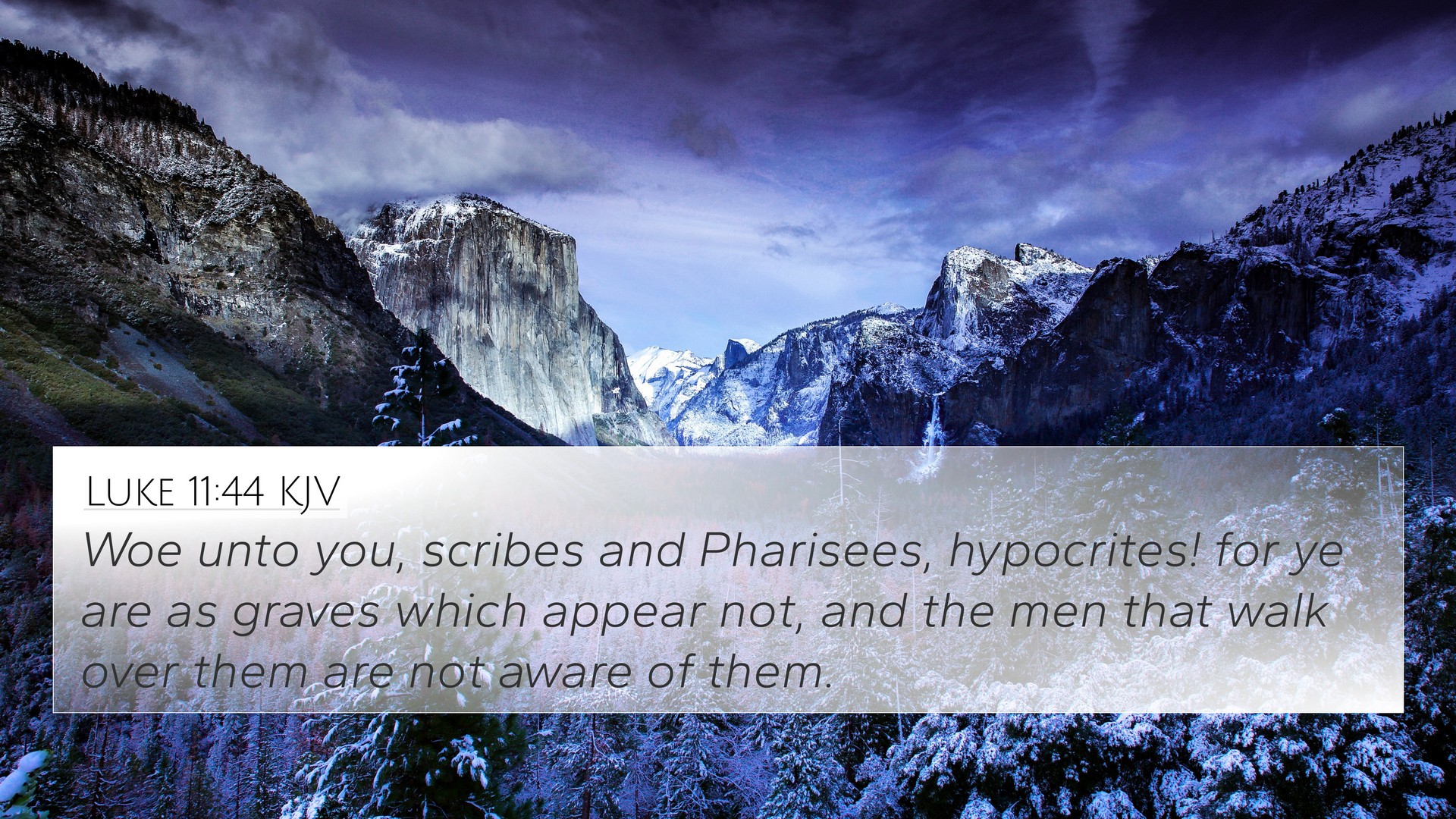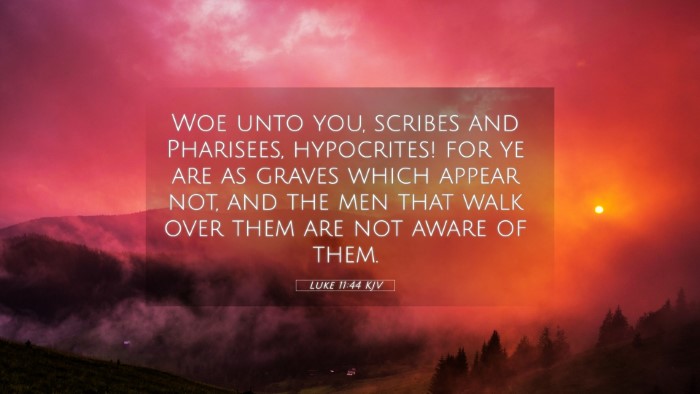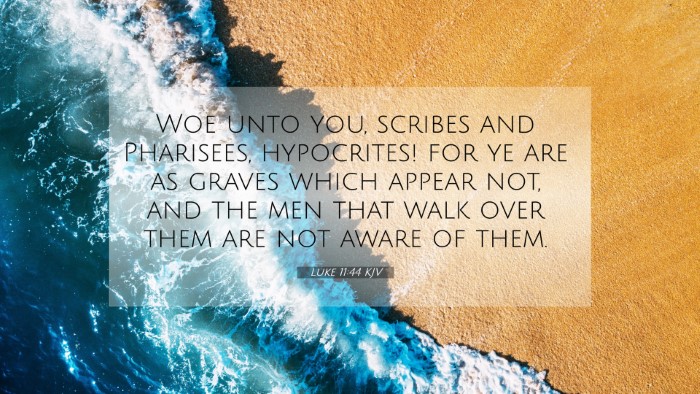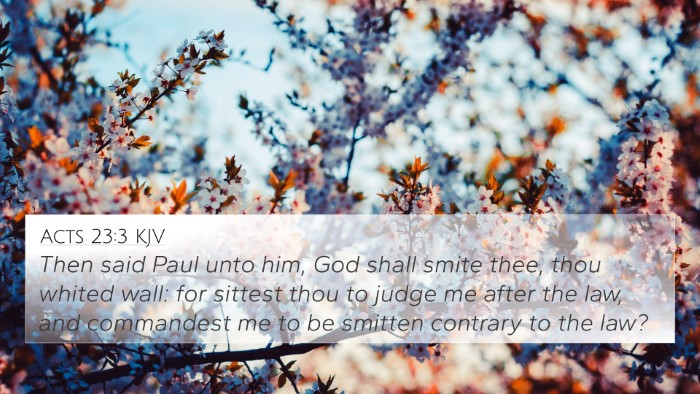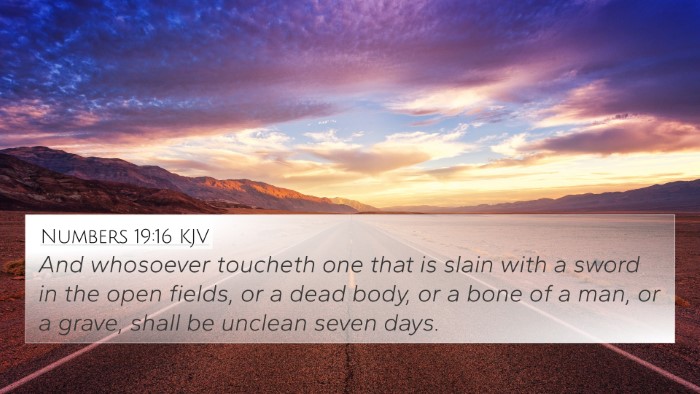Understanding Luke 11:44
Luke 11:44 states: "Woe to you! For you are like graves which are not seen, and the men who walk over them are not aware of them." This verse highlights the condemnation of the scribes and Pharisees for their hypocrisy and spiritual blindness.
Context and Overview
In the context of this passage, Jesus is addressing the religious leaders who, outwardly, appeared to be righteous but were inwardly corrupt. They are likened to unmarked graves, implying that they defile others without their knowledge.
Key Themes
- Hypocrisy: The religious leaders are criticized for maintaining an appearance of morality while harboring corruption.
- Spiritual blindness: They are unable to see their own faults, leading others astray.
- Defilement: The analogy of graves signifies that their practices contaminate those who come in contact with them.
Commentary Insights
Matthew Henry: Henry outlines that the metaphor of graves describes how the Pharisees present themselves as authorities on purity while being sources of spiritual decay. Their failure to recognize their state leads to the misguidance of others.
Albert Barnes: Barnes emphasizes the deception of the scribes, noting that their lack of self-awareness prevents them from leading others properly. He points out that walking over unmarked graves would result in ceremonial uncleanness, portraying how their influence can lead to spiritual contamination.
Adam Clarke: Clarke elaborates that the warning serves as a critique against those who prioritize outward appearances over inner virtue. He aligns this with a broader theme in scripture about knowing one's own heart and the necessity for genuine repentance.
Bible Verse Cross-References
This verse connects profoundly with several other scriptures that illustrate themes of hypocrisy, judgment, and spiritual awareness:
- Matthew 23:27-28: "Woe to you, Scribes and Pharisees, hypocrites! For you are like whitewashed tombs."
- John 7:24: "Do not judge according to appearance, but judge with righteous judgment."
- Isaiah 29:13: "These people draw near with their mouths and honor Me with their lips, but have removed their hearts far from Me."
- Matthew 15:14: "Let them alone; they are blind leaders of the blind, and if the blind leads the blind, both will fall into a ditch."
- James 1:26: "If anyone among you thinks he is religious, and does not bridle his tongue but deceives his own heart, this one's religion is useless."
- 1 Peter 2:9: "But you are a chosen generation, a royal priesthood, a holy nation, His own special people..."
- Proverbs 4:23: "Keep your heart with all diligence, for out of it spring the issues of life."
Thematic Bible Verse Connections
Exploring connections between Bible verses reveals a network of themes surrounding hypocrisy and the concern for inner purity. Here are some comparative analyses:
- Linking Old and New Testament: Both Isaiah 29:13 and Matthew 15:14 emphasize God’s disdain for mere external worship.
- Bible verse parallels: The imagery of graves in Luke 11:44 mirrors the whitewashed tombs of Matthew 23:27, reinforcing the theme of deceptive appearances.
- Inter-Biblical dialogue: The attitudes of the Pharisees reflect ancient warnings found in Proverbs 4:23 about guarding one’s heart from corruption.
- Character studies: Comparing the figures of the scribes and the teachings of Jesus provides insights into the expectations of spiritual leaders.
How to Use Bible Cross-References
Employing tools for Bible cross-referencing enhances understanding. Approaches include:
- Bible concordance: A comprehensive guide for locating themes and direct connections between scriptures.
- Cross-reference Bible study: Dedicating time to explore related verses can deepen your insight into a passage's significance.
- Bible reference resources: Utilizing study tools that categorize verses can facilitate thematic investigations.
- Bible chain references: Following a chain of references from a single verse can illuminate broader biblical narratives.
Conclusion
Luke 11:44 serves as a profound warning about the dangers of hypocrisy and spiritual blindness. By understanding its implications and exploring cross-references, believers are encouraged to pursue authentic faith and vigilance against superficiality in spiritual matters.
